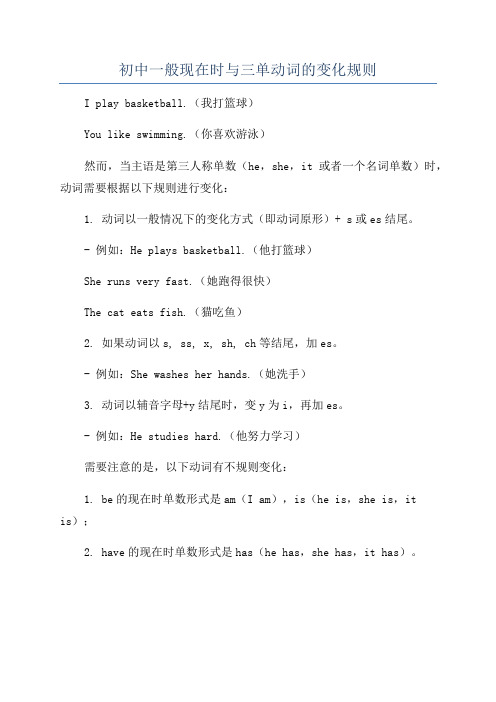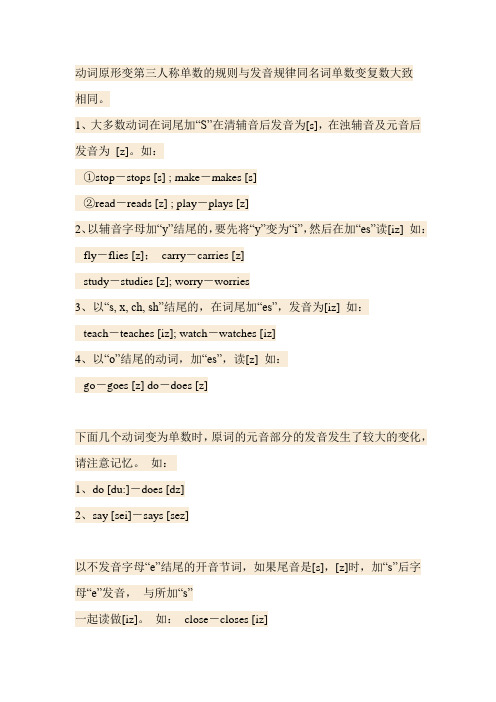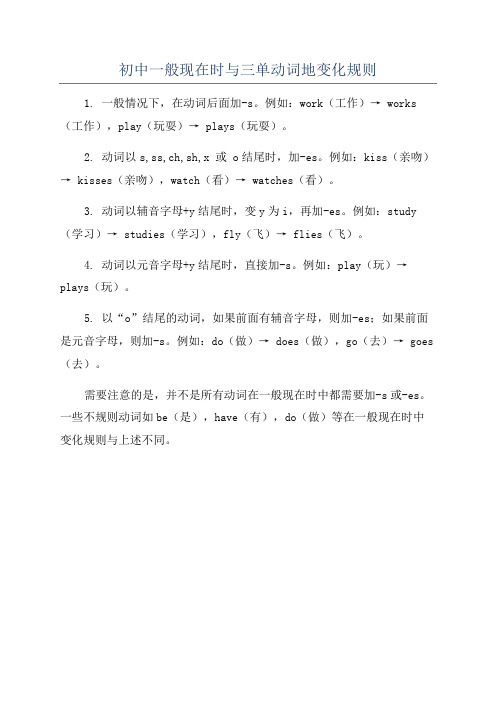(完整版)一般现在时动词第三人称单数变化规则
初中一般现在时与三单动词的变化规则

初中一般现在时与三单动词的变化规则
I play basketball.(我打篮球)
You like swimming.(你喜欢游泳)
然而,当主语是第三人称单数(he,she,it或者一个名词单数)时,动词需要根据以下规则进行变化:
1. 动词以一般情况下的变化方式(即动词原形)+ s或es结尾。
- 例如:He plays basketball.(他打篮球)
She runs very fast.(她跑得很快)
The cat eats fish.(猫吃鱼)
2. 如果动词以s, ss, x, sh, ch等结尾,加es。
- 例如:She washes her hands.(她洗手)
3. 动词以辅音字母+y结尾时,变y为i,再加es。
- 例如:He studies hard.(他努力学习)
需要注意的是,以下动词有不规则变化:
1. be的现在时单数形式是am(I am),is(he is,she is,it is);
2. have的现在时单数形式是has(he has,she has,it has)。
(完整版)动词变第三人称单数规则

动词原形变第三人称单数的规则与发音规律同名词单数变复数大致相同。
1、大多数动词在词尾加“S”在清辅音后发音为[s],在浊辅音及元音后发音为[z]。
如:①stop-stops [s] ; make-makes [s]②read-reads [z] ; play-plays [z]2、以辅音字母加“y”结尾的,要先将“y”变为“i”,然后在加“es”读[iz] 如: fly-flies [z];carry-carries [z]study-studies [z]; worry-worries3、以“s, x, ch, sh”结尾的,在词尾加“es”,发音为[iz] 如:teach-teaches [iz]; watch-watches [iz]4、以“o”结尾的动词,加“es”,读[z] 如:go-goes [z] do-does [z]下面几个动词变为单数时,原词的元音部分的发音发生了较大的变化,请注意记忆。
如:1、do [du:]-does [dz]2、say [sei]-says [sez]以不发音字母“e”结尾的开音节词,如果尾音是[s],[z]时,加“s”后字母“e”发音,与所加“s”一起读做[iz]。
如:close-closes [iz]be动词包括:am,is,are。
第三人称单数用is;过去式为was;复数用are,过去式为were.除上述规律外,还应注意下面三点:1. 动词have ,遇到主语是第三人称单数时,要用has;动词be 的第三人称单数形式是is。
2. 含有动词第三人称单数形式的句子变否定句时,要用doesn't + 动词原形,如:He goes to school at six in the morning. (变否定句)→ He doesn't go to school at six in the morning.3. 对含有动词第三人称单数形式的句子提问时,要用助动词does,如:She goes home at five every day. (对划线部分提问)→ When / What time does she go home every day?一般现在时中的第三人称单数形式在一般现在时中,当主语是第三人称单数时,谓语动词要用第三人称单数形式,即常在动词原形后加-s或-es。
动词第三人称单数变化规则

动词第三人称单数变化规则1、一般现在时主语第三人称时的动词变化”-s”①在一般现在时中,当主语为第三人称单数时,动词要用“-s”型(即第三人称单数形式)。
②所谓动词“s”型的构成,可按名词变复数的规则来记,即:•(1)大多数动词直接加__S_ 如:Play-plays,swim-swims.•(2)以_s,x,_ch,_sh,_o_结尾的动词,后面加_es__ 如:watch-watches,wash-washes.go-goes.teach-teaches •(3)以辅音字母加y结尾的变_y__ 为_i__加_es__ 如:study-studies, fly-flies•(4)特殊变化:have - has一.写出下列动词的第三人称单数形式。
read ______go ______stay _____ make _______ brush_______look______have_____ carry___ come______teach_______watch______play_______ fly______study______二、根据所给单词的适当形式填空• 1 He ___ the piano very well. (play)• 2 She ___ got a stamp from Canada .(have)• 3 I ___ housework at home (do)• 4 Eric ___ to school at 6:00 o’clock. (go)• 5 He clothes at home. (wash)• 6 My teacher often ___ TV in the evening. (watch)•7 Daming ___ English well every day.(study)•8 The boys ___ swimming (like)•9 She ____ from America.(come)•10 He ____ like his mother.(look)。
初中一般现在时与三单动词地变化规则

初中一般现在时与三单动词地变化规则
1. 一般情况下,在动词后面加-s。
例如:work(工作)→ works (工作),play(玩耍)→ plays(玩耍)。
2. 动词以s,ss,ch,sh,x 或 o结尾时,加-es。
例如:kiss(亲吻)→ kisses(亲吻),watch(看)→ watches(看)。
3. 动词以辅音字母+y结尾时,变y为i,再加-es。
例如:study (学习)→ studies(学习),fly(飞)→ flies(飞)。
4. 动词以元音字母+y结尾时,直接加-s。
例如:play(玩)→ plays(玩)。
5. 以“o”结尾的动词,如果前面有辅音字母,则加-es;如果前面是元音字母,则加-s。
例如:do(做)→ does(做),go(去)→ goes (去)。
需要注意的是,并不是所有动词在一般现在时中都需要加-s或-es。
一些不规则动词如be(是),have(有),do(做)等在一般现在时中变化规则与上述不同。
动词的三种变化规则

动词的三种变化规则一、一般现在时的变化规则一般现在时是用来描述经常性或习惯性的动作、状态或真理的。
在一般现在时中,动词的变化规则如下:1. 第三人称单数形式:在一般现在时中,第三人称单数的动词要加上-s或-es。
例如,he sings,she dances。
2. 其他人称和复数形式:在一般现在时中,除了第三人称单数外的其他人称和复数形式的动词保持不变。
例如,I sing,we dance。
3. 动词的原形:在一般现在时中,动词的原形用于第一人称单数和其他人称复数形式。
例如,I sing,they dance。
举例来说,假设有一个句子:“She (study) every day.” 根据一般现在时的变化规则,我们可以将动词study变为第三人称单数形式studies,得到句子“She studies every day.”二、一般过去时的变化规则一般过去时用于描述在过去发生的动作或存在的状态。
在一般过去时中,动词的变化规则如下:1. 动词的过去式形式:在一般过去时中,动词的过去式形式通常是在动词原形的基础上加上-ed或-d。
例如,play → played,work→ worked。
2. 动词的原形:在一般过去时中,动词的原形用于第一人称单数、第二人称和其他人称复数形式。
例如,I played,you worked,they danced。
举例来说,假设有一个句子:“He (go) to the park yesterday.” 根据一般过去时的变化规则,我们可以将动词go变为过去式went,得到句子“He went to the park yesterday.”三、将来时的变化规则将来时用于描述将来发生的动作或存在的状态。
在将来时中,动词的变化规则如下:1. 动词的将来式形式:在将来时中,动词的将来式形式通常是在动词原形的基础上加上will。
例如,play → will play,work → will work。
动词第三人称单数形式构成规则

般现在时动词第三人称单数形式构成规则(一般现在时中主语时第三人称1大多数动词在词尾加“S”如:①stop —stops make —makes read —reads play —plays [z]2、以辅音字母加“ y”结尾的,要先将“ y”变为“ i ”,然后在加“ es”读[iz]女口:fly —flies carry —carries study —studies worry —worries3、以“ s, x, ch, sh ”结尾的,在词尾加“ es”,发音为如:teach —teaches watch —watches4、以“ o”结尾的动词,加“ es”,如:go —goes do —does5、以不发音字母“ e”结尾的开音节词,加“s ”女口:close —closes [iz]6、be 动词包括:am,is ,are 。
第三人称单数用is ;过去式为was ;复数用are ,过去式为were.1. 动词have ,遇到主语是第三人称单数时,要用has ;动词be 的第三人称单数形式是is 。
2. 含有动词第三人称单数形式的句子变否定句时,要用doesn't + 动词原形,如:He goes to school at six in the morning.(变否定句)He does n't go to schoolat six in the morning.3. 对含有动词第三人称单数形式的句子提问时,要用助动词does,如:She goes home at five every day.(对划线部分提问)When / What time does shego home every day?般现在时中的第三人称单数形式在一般现在时中,当主语是第三人称单数时,谓语动词要用第三人称单数形式,原形后加即常在动词-s 或-es 。
I 什么是一般现在时?一般现在时的基本用法有哪些呢?No. 1 】一般现在时的功能1. 表示事物或人物的特征、状态。
一般现在时主语单三人称时的动词变化

一般现在时主语单三人称时的动词变化第一篇:一般现在时主语单三人称时的动词变化一般现在时主语单三人称时的动词变化①在一般现在时中,当主语为第三人称单数时,动词要用“s”型(即第三人称单数形式)。
②所谓动词“s”型的构成,可按名词变复数的规则来记,即:i)在动词尾直接加s。
如:play—plays,want—wants,work—works,know—knows,help—helps,get—gets ii)以字母s、x、ch或o结尾的动词加-es;如: guess—guesses,fix—fixes,teach—teaches,brush—brushes,go—goes,do—does,watch—watches,catch—catchesiii)以辅音字母+y结尾的动词,先变y为i,再加-es。
如:study—studies,carry—carries,fly—flies,worry—worries iv)③④强调如何将主语是第三人称单数的肯定句变为否定和疑问句。
现举例说明(用划线部分来说明顺口溜):1)His mother works in a factory.His mother doesn’t work in a factory.Does his mother work in a factory?2)Mr Li teaches us English.Mr Li doesn’t teach us English.Does Mr Li teach you English?3)My brother studies maths well.My brother doesn't study maths well.Does your brother study maths well?第二篇:一般现在时主语第三人称时的动词变化一般现在时主语第三人称时的动词变化(名词的复数变化规律)①在一般现在时中,当主语为第三人称单数时,动词要用―s‖型(即第三人称单数形式)。
英语动词第三人称单数变化规则

英语动词第三人称单数变化规则一般现在时的肯定句中,主语为第三人称单数的动词变化主要体现在词尾的变化上,其规律为:规则原形第三人称单数形式 1、一般情况下,直接在动词词尾+s如:get take play gets takes plays2、以s, x, sh, ch, o结尾的动词,在词尾+ esguess fix finish teach go和do guesses fixes finishes teaches goes和does3、以辅音字母+ y 结尾的动词,先把y变为i,再加esstudy try fly carry worrystudies tries flies carries worries4、不规则动词(特殊情况)have behas is1、变否定句:含有动词第三人称单数形式的句子变否定句时,要在动词前面加上doesn’t 或does not,动词的第三人称单数形式要还原成原形:格式为doesn’t/does not + 动词原形,如:He goes to school at six in the morning. (变否定句) →He doesn't go to school at six in the morning.2、变一般疑问句:把含有动词第三人称单数形式的变成一般疑问句时,要借用助动词does,如:She goes home at five every day. →Does she go home at five every day? --- Yes, she does./No, she doesn’t.哪些主语是第三人称单数? 1、人称代词he, she, it;如:He likes watching TV. 他喜欢看电视。
She has lunch at twelve. 她十二点吃午餐。
It looks like a cat. 它看起来像只猫。
2、单个人名、地名或称呼作主语;是第三人称单数。
- 1、下载文档前请自行甄别文档内容的完整性,平台不提供额外的编辑、内容补充、找答案等附加服务。
- 2、"仅部分预览"的文档,不可在线预览部分如存在完整性等问题,可反馈申请退款(可完整预览的文档不适用该条件!)。
- 3、如文档侵犯您的权益,请联系客服反馈,我们会尽快为您处理(人工客服工作时间:9:00-18:30)。
一、概述一般现在时的概念和用法:(1)表示现阶段经常、反复、习惯性的动作;(2)表示目前的状况;(3)表示自然界的客观真理。
二、一般现在时的结构时态的结构指的是动词的变化形式。
一般现在时间有两种结构,一种是动词原形,用于主语为非第三人称时的情况;另一种为动词的第三人称单数形式,用于主语为第三人称时的情况.Eg1。
We often get up early in the morning.Eg2。
My father often gets up early in the morning。
三、谈谈“主语为三单,其后动词s添”在一般现在时中,当主语为第三人称单数时,谓语动词要用第三人称单数形式。
可以简单叙述为“主语为三单,其后动词s添”。
何谓第三人称单数?用一句话概括就是“非你、非我、非复数”,如he, she, it, my father, my mother, my sister, our English teacher, Tom, Mike, Liu Jia, China, my book, etc。
Eg3。
He sometimes goes to school by bike。
Eg4.My father works in the hospital as a doctor。
四、一般现在时的肯定句中,主语为第三人称单数的动词变化主要体现在词尾的变化上,其规律为:(与名词变成复数的变法大致相同。
)五、一般现在时的句子转换(1)当句子中有be动词或情态动词时,则把be动词或情态动词(can,could等等)提到主语的前面变成一般疑问句;在be动词或情态动词后面加not变成否定句。
例:①陈述句:She is a student.一般疑问句→ Is she a student?否定句→ She is not a student。
②陈述句:I can swim.一般疑问句→ Can you swim否定句→ I can not swim。
(2)当句子中即没有be动词,也没有情态动词时,则在主语前加助动词do (you,以及复数), does(单数she,he,it)变成一般疑问句;在主语后谓语动词前加助动词don't(I,you,以及复数), doesn’t(单数she,he,it)变成否定句,助动词后的动词要变成动词原形。
例:①陈述句:We get up at 7:00 every morning。
一般疑问句→Do you get up at 7:00 every morning?否定句→We don’t get up at 7:00 every morning.②陈述句:She has a little brother.一般疑问句→ Does she have a little brother?否定句→ She doesn’t have a little brother.哪些主语是第三人称单数?1、人称代词he, she, it;如:He likes watching TV。
他喜欢看电视。
She has lunch at twelve. 她十二点吃午餐.It looks like a cat. 它看起来像只猫.2、单个人名、地名或称呼作主语;是第三人称单数。
如:Han Mei looks like her mother。
韩梅看起来像她的母亲。
Beijing is in China。
北京在中国。
Uncle Wang often makes cakes。
王叔叔经常做蛋糕。
3、单数可数名词或this / that / the + 单数可数名词作主语时,是第三人称单数;A horse is a useful animal。
马是有用的动物.This book is yours. 这本书是你的。
That car is red. 那辆小汽车是红色的。
The cat is Lucy’s。
只猫是露茜的。
4、不可数名词作主语时为第三人称单数。
如:The milk is in the glass。
牛奶在玻璃杯里。
The bread is very small. 那面包很小。
The water is very cold. 那些水很凉。
1、写出下列动词的第三人称单数。
drink ________ go _______ stay ________ make ________ look _________have_______ pass_______ carry _______ come________ watch________plant_______ fly ________ study_______ brush________ teach________catch_________ wash___________do________ like________ say_______learn ___________eat___________ read___________ sing___________ buy__________study_______ come__________plant(种植)______2、用括号内动词的适当形式填空.1. He often ________(have) dinner at home.2。
We _____________ (not watch) TV on Monday.3。
Nick ___________ (not go) to the zoo on Sunday.4. ________ they __________ (like) the World Cup?5. What _________they often _________ (do) on Saturdays?6. _________ your parents _________ (read) newspapers every day?7. There ________(be) some water in the bottle.8。
My aunt _______(look) after her baby carefully。
9。
The child often _______(watch) TV in the evening。
10. Mike’s sister ________ (cook) nice food. I _______ (like) eating it very much. 11。
_______ (do) your brother_______ (watch) TV in the evening? No, he_______ (not). 12。
We often___________(play) in the playground.13。
He _________(get)up at six o’clock。
14。
__________you_________(brush) your teeth every morning。
15。
What________ (do) he usually______ (do) after school?16.Danny_______(study)English,Chinese,Maths,Science and Art at school.17。
Mike sometimes __________(go) to the park with his sister.18. At eight at night, she often__________(watch) TV with his parents。
19。
________ Mike________(read) English every day?20.How many lessons_________your classmate________(have) on Monday? 21。
What time_________his mother_________(do) the housework?1。
We _____________ ( go ) to school on foot every day .2.They ______________( not have ) any lessons on Sundays 。
3.She _____________ ( brush ) her teeth twice a day 。
4.These students ____________ ( be not ) good at boating 。
5。
Wei Hua always ____________( carry ) water for his grandpa on Sundays .6.___________Kate ____________( like ) making friends ?7。
The lazy boy ______________( not do ) his homework in the evening .8。
How many classes _________you __________( have ) every day?9。
Who __________the baby ___________( look ) like ?10。
He can ___________( teach ) us Enlgish well 。
11. He often ________(have) dinner at home.12. Daniel and Tommy _______(be) in Class One.13. Nick _________(not go) to the zoo on Sunday。
14. What _______they often _______(do) on Saturdays?15. _______ your parents _______(read) newspapers every day?16。
The girl ____________(teach) us English on Sundays。
17. She and I ________(take) a walk together every evening。
18。
There ________(be) some water in the bottle。
19. They _______(have) the same hobby。
20. My aunt __________(look) after her baby carefully.21. You always _______(do) your homework well.22。
